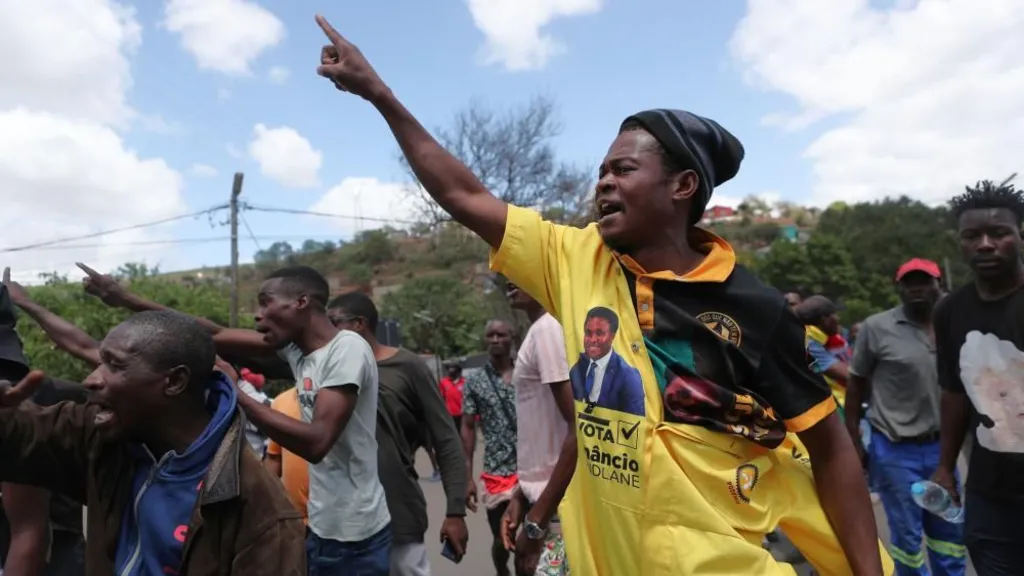Mozambique bans protests after weeks of post-poll violence
4 min read
Mozambique’s government has imposed a ban on protests following weeks of violent unrest that erupted after the country’s controversial presidential elections. The protests, which have led to clashes with police and resulted in multiple fatalities, began after the announcement of the election results in October. The ruling party, Frelimo, which has been in power since the country gained independence in 1975, was declared the winner, securing over 71% of the vote.
The unrest, which has now lasted for several weeks, has left at least 18 people dead, according to Human Rights Watch, although some rights organizations claim the death toll could be higher, with reports suggesting more than 30 fatalities. Dozens more have been injured as demonstrators clashed with security forces. The violence and the growing dissatisfaction with the election results have prompted the government to take drastic measures, including banning all further protests.
In a statement issued by Mozambique’s Interior Minister, Pascoal Ronda, the ongoing protests were labeled as “acts of terrorism.” Ronda urged the public to cooperate with authorities, condemning the protests as a threat to national stability. “I no longer call these protests, I call them acts of subversion and terrorism,” he said. “They terrorize people, preventing them from going about their daily lives.”
The protests first erupted in the capital, Maputo, shortly after the official declaration of Daniel Chapo from Frelimo as the winner of the election. Opposition parties, including the Mozambique Democratic Movement (MDM), have accused the government of rigging the election and suppressing opposition. Venâncio Mondlane, the main opposition leader who came second with 20% of the vote, had gone into hiding before the election results were announced. Mondlane’s fears for his safety were compounded after reports surfaced that his aide and lawyer had been killed while preparing to challenge the election results.
The protests quickly spread, and on Thursday, the violence escalated with clashes between demonstrators and the police. Thousands of people took to the streets of Maputo, setting fires and blocking roads, while police responded with tear gas and rubber bullets. The protests have been described as some of the most intense since they began on October 9, with the authorities deploying military personnel to restore order.
In his remarks, Minister Ronda stressed that the protests were not legitimate expressions of dissent but were instead orchestrated attempts to destabilize the country. He accused protest leaders of using “drugged youth” to foment violence and create chaos. The government has vowed to take strong action to counter the unrest, promising to “fight crime” and restore order.
The protests and the government’s response have drawn international attention. The South African government temporarily closed one of its border crossings with Mozambique in response to the unrest. Additionally, two journalists from the South African news outlet News Central TV, who were covering the protests in Maputo, were reportedly detained by authorities. The station has expressed concern over their detentions, noting that efforts to contact the journalists have been unsuccessful. “The detention of our colleagues while performing their professional duties is deeply concerning,” News Central TV said in a statement, emphasizing that it was working through diplomatic channels to secure their release.
Meanwhile, the government has also restricted internet access across much of the country, which Human Rights Watch has called a deliberate attempt to suppress both peaceful protests and public criticism of the government. The crackdown on communication channels has raised concerns over the erosion of civil liberties in the country.
Opposition parties and election observers have continued to allege widespread irregularities during the presidential election, claiming that the vote was neither free nor fair. The government has vehemently denied these claims, asserting that the elections were legitimate and in accordance with the country’s laws. However, these ongoing protests are a sign of deep dissatisfaction among many Mozambicans, who question the transparency and fairness of the election process.
The 2024 election marked the end of President Filipe Nyusi’s second term in office, as the country’s constitution limits presidents to two terms. Nyusi, who has been in power since 2015, is stepping down, but his government’s handling of the post-election unrest is likely to have lasting repercussions. As protests continue to unfold across the country, the government faces increasing pressure from both domestic and international observers to address the grievances of the opposition and prevent further violence.
The situation remains tense in Mozambique, and the government’s ban on protests, along with its heavy-handed approach to containing the unrest, has raised concerns about the future of democracy and political freedoms in the country. While the ban may temporarily quell demonstrations, it remains to be seen how the government will navigate the ongoing discontent and the demands for electoral reform from opposition groups and civil society.







